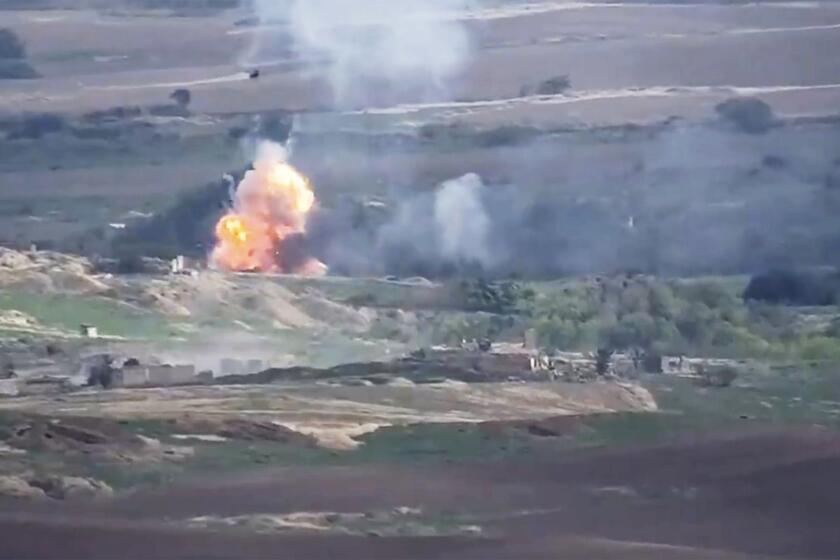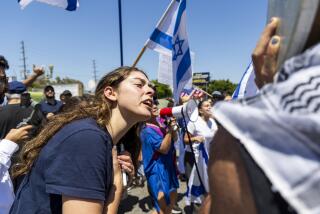Armenian protesters in L.A. decry ‘false equivalence’ in media coverage of conflict
- Share via
Protesters rallied over the weekend outside media offices in Hollywood and onto freeways in the latest demonstrations calling attention to violence in a contested area in the southern Caucasus that has become the subject of renewed fighting between Armenia and Azerbaijan over the past week.
Dozens of civilians have been killed since Sept. 27, officials in both countries say, in the biggest escalation in the decades-old conflict over Nagorno-Karabakh — which Armenians call by its historic name, Artsakh — since the 1990s. The tiny mountainous enclave is recognized internationally as part of Azerbaijan, but its population of about 150,000 is majority ethnic Armenian, and it is financially backed by Armenia.
The demonstrations Saturday and Sunday came together spontaneously on social media and drew about 500 participants to the CNN building, where they gathered outside and called for broadcast outlets to provide more accurate coverage of the conflict. Activists also marched onto the 101 and 170 freeways, blocking traffic, according to the California Highway Patrol.
“If there’s a problem here, it’s the false equivalence international media has drawn toward Armenia and Azerbaijan,” said Alex Galitsky, communications director for the Armenian National Committee of America, Western Region. “Armenia is acting out of self-defense to preserve the existence of its people, and Azerbaijan is acting out of aggression.”
Armenians say the conflict was instigated by Azerbaijan with the backing of Turkey after months of planning. Many described it as a push to finish the Armenian genocide begun by Turkey’s precursor, the Ottoman Empire, in 1915. They say Turkey has sent paid Islamic State mercenaries from Syria to fight in the region, a claim that has been backed by the leaders of France and Russia. And they characterize both Nagorno-Karabakh and Armenia as tiny Christian and Democratic strongholds that are being attacked by much richer and stronger Muslim and authoritarian nations in a display of brute force.
Turkey has publicly sided with Azerbaijan but has denied sending fighters to the area.
As Armenia-Azerbaijan fighting intensifies over separatist region, wider rivalries could come into play
Mayor Eric Garcetti on Sunday said: “We stand with the people of Armenia. I urge our leaders in Washington to conduct the sustained and rigorous diplomacy necessary to bring peace to the Artsakh region. Turkey must disengage.”
The conflict has galvanized the Armenian community in Los Angeles, which is home to more Armenians than any city other than the capital of Armenia, Galitsky said.
“Many of those in our community are descendants of Armenian genocide survivors,” he said. “As a result, they see what’s happening as very much a continuation of what was done 105 years ago.”
The majority of Armenians here know people who are fighting on the front lines of the conflict, and they’ve also seen tension spill over into the diaspora community, with armed Azerbaijani counterprotesters attending a pro-Armenian demonstration in July, he said.
“Our community is so united around this issue and so united in their condemnation of Azerbaijan,” Galitsky said, “but also in the belief that what Azerbaijan represents is an existential threat to Armenian people, and there is a need for our entire community internationally to rally around our nation and do whatever we can to support it.”
Shortly after 10 p.m. Saturday, some protesters spilled onto the 101 Freeway near Sunset Boulevard. They dispersed less than an hour later, said Chris Baldonado, public information officer with the California Highway Patrol. No arrests were made.
A group of protesters camped outside the CNN building overnight, and some remained there Sunday afternoon. They said they planned to continue demonstrating until they saw fair news coverage.
Another rally was held Sunday evening in Glendale.
“We’re doing everything possible to fight the Azerbaijani propaganda war machine, which is basically spewing lies across different media outlets,” said Raffi Kassabian, vice chair of the Armenian National Committee of America, Western Region. “We want to make sure the world is aware of both Turkey and Azerbaijan’s neo-Ottomanism, which is an ethnic cleansing of Armenians to basically drive them off historical Armenian land.”
Protesters are also calling on the international community to clearly side with Armenia and to condemn Azerbaijan and Turkey for perpetrating human rights abuses, rather than simply calling for both sides to come to the table and negotiate.
Though the conflict concerns an enclave that’s only about 1½ times the size of Yosemite National Park, it has far-reaching implications.
Russia is friendly with both Armenia and Azerbaijan but has a defense alliance with Armenia, as well as a military base there. Still, Armenia is unlikely to call on Russia for help, as it has tried to distance itself from the superpower since Armenia’s Democratic revolution in 2018, said Tamara Voskanian, a Los Angeles Armenian-American ethics attorney and advocate.
In turn, she said, the United States, Russia and other world powers have been hesitant to get involved because they don’t want to be dragged into what could become an all-out war. They are also distracted by the COVID-19 pandemic and the fresh upheaval President Trump’s illness has heaped on the upcoming U.S. election, she said.
“The timing is awful,” she said.
With the attention of the global community diverted elsewhere, Azerbaijan has staged displays of aggression that include shelling civilians in Stepanakert, the capital of Nagorno-Karabakh, Voskanian said.
“I truly do believe there are war crimes being committed,” Voskanian said. “They’re not trying to hit military targets — they’re trying to hit people.”
Azerbaijan has also accused Armenia of targeting civilians and claims that it instigated the conflict.
“Azerbaijan is defending itself, its civilian population, on its own soil and with its own armed forces,” Nasimi Aghayev of the Consulate General of Azerbaijan in Los Angeles said late Saturday in a videotaped statement. He denied that religion has played a role in the conflict and described portrayals of it as such as propaganda advanced by Armenia and its allies.
“The racist and white supremacist propaganda promoted by Armenia and their allies, with which they intend to cash in on the already divisive environment and Islamophobic prejudices, must be condemned by everyone who believe that such dangerous bigotry and intolerance have no place in Europe, U.S. or anywhere else,” Aghayev said.
The conflict dates back decades. Nagorno-Karabakh gained autonomous status in the Soviet era, but its struggle to break away from Azerbaijan outright began even before the 1991 collapse of the Soviet Union. Fighting from 1988 onward killed about 30,000 people and displaced 1 million. That battle ended with a 1994 cease-fire and de facto self-rule.
Violent flare-ups have occurred periodically, including in 2016, when clashes left at least 200 people dead, as well as in July and August.
For Armenians, the fight is one to maintain control of their ancestral homeland.
“If we lose Artsakh, we lose, really, the heart of present-day Armenia,” Voskanian said.
She noted that most Armenians around the world were displaced by ethnic cleansing, with roughly 10 million living outside their home country, compared with 3 million within it.
“For Azerbaijan, this is about a notch on a belt, a territory, bragging rights, pride and maintaining dictatorship,” Voskanian said. “For Armenians, it’s about way more than that. It’s about keeping the tiny percentage of land that we have left, because without that, we don’t know how we’re going to survive as a people around the world.”
Times staff writer Laura King contributed to this report.
More to Read
Sign up for Essential California
The most important California stories and recommendations in your inbox every morning.
You may occasionally receive promotional content from the Los Angeles Times.












